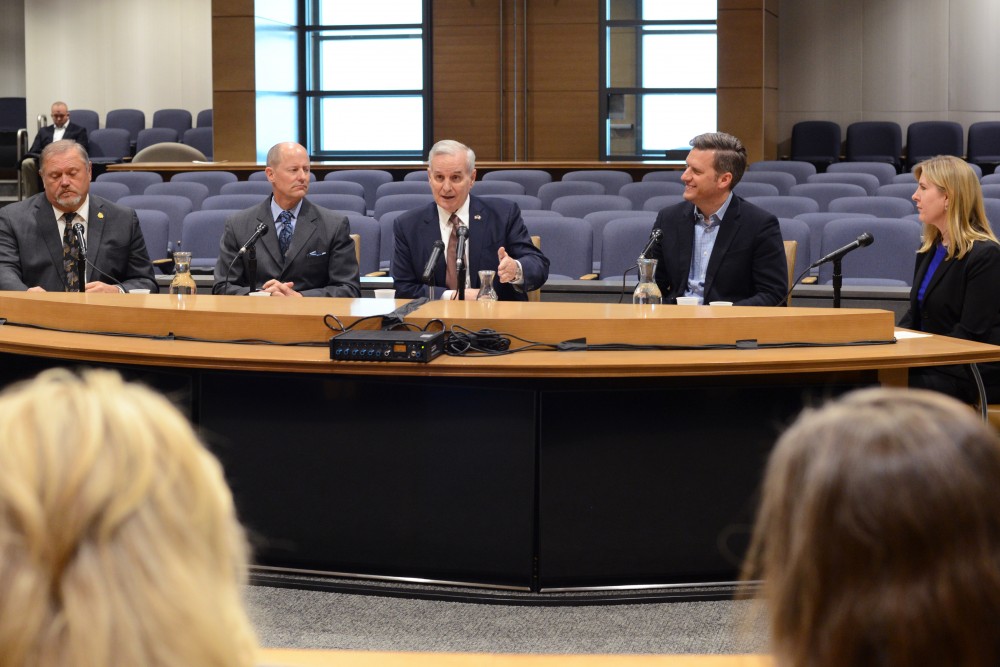Gov. Mark Dayton and legislative leaders met Tuesday to preview the upcoming session before its Feb. 20 start date.
The hour-long forum, hosted by the Forum News Service at the Senate Office Building in St. Paul, focused on legislative priorities and legal conflicts between the executive and legislative branches.
A public works bonding bill was a focus of the discussion, but Dayton and legislative leaders differed on how much should be spent.
“I think $1.5 billion is a very responsible bill,” Dayton said, “and I think, frankly, is inadequate for the scope and the needs of local government and local issues.”
Dayton’s $1.5 billion proposal includes $298 million for the University of Minnesota — $60 million more than the school asked for in its 2018 capital request.
The additional money would go toward a backlog of maintenance and structural needs at the University, Dayton said, caused by a lack of state funding in past years.
Senate Minority Leader Tom Bakk, DFL-Cook, said he would like to see two separate bonding bills to address state infrastructure needs.
“Let’s just take the politics out and all admit that we’re all falling way, way behind,” he said.
Bakk said Minnesota should take notice of President Donald Trump’s infrastructure plan and prepare to fund maintenance separately to possibly qualify for additional federal funds.
House Minority Leader Melissa Hortman, DFL-Brooklyn Park, said she wants a larger bonding bill now because of low interest rates that could soon rise.
“This is the time for the state to maximize its borrowing and get those projects underway because they are going to be more expensive in the future for two reasons: we know inflation is coming, and we know interest rates are going up,” Hortman said.
House Speaker Kurt Daudt, R-Crown, said an $800 million bonding bill would be more fiscally reasonable. And Senate Majority Leader Paul Gazelka, R-Nisswa, said he would like to see a bill that is significantly less than $1 billion, but is open to negotiation.
The Legislature also needs to pass an operating budget.
Legislative leaders have been operating on carry-over funding since Dayton utilized his line-item veto on their budget last May. The issue was litigated in the Minnesota Supreme Court in August, with the court ruling in Dayton’s favor in September.
“I want to sign the [legislative budget] bill. I want to put it all behind us. I want to move forward,” Dayton said.
The legislative leaders could not agree to a clean funding bill during the forum, even though Dayton said he prefers one.
Hortman said she wants to be involved in the legislative budget bill process and may use it to revisit “unfinished business” from the end of last session.
“If the Speaker would like to pass that budget with any DFL votes, we’ll need to have a conversation about what [the bill] looks like,” Hortman said.
Daudt said the best way to move forward is through a clean legislative budget bill without adding amendments for other priorities, which may make the process more difficult.
“Our intent is not to add anything extra into that [budget] bill,” Daudt said. “Our intent is to send a bill just the way it was.”
A new campus neutrality bill aimed at protecting free speech on college campuses was discussed by Gazelka, Daudt and Hortman during the forum.
“I think if a campus invites someone who is more liberal or more conservative, they should have the right to share their views,” Gazelka said. “The University of Minnesota, I think, does a reasonable job of doing that.”
The Legislature convenes at noon, next Tuesday.







